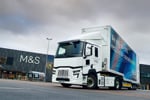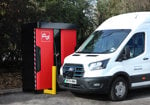Once the epitome of the company car in the form of the all-conquering Ford Cortina and Vauxhall Cavalier, the D-sector used to be the first career point where the car combined both 'work and perk'.
Below languished unloved essential-use work cars, while above lay the golden path to senior management and luxury motoring.
Now, however, the D-sector is facing a pincer movement attack.
On the one hand, lower-medium cars such as the Audi A3, Volkswagen Golf, Renault Scenic and Vauxhall Zafira meet company drivers' brand and lifestyle aspirations just as well as more costly upper- medium cars. They offer access to lower benefit-in-kind tax bills for company car drivers and are proving more popular with used car buyers and consequently retaining their value better than their larger siblings, thereby delivering lower wholelife costs to fleet operators.
On the other hand, cars from prestige marques such as Audi, BMW, Jaguar, Lexus and Mercedes-Benz are offering wholelife cost profiles that are competitive with their mainstream brethren.
The only option for traditional fleet manufacturers is to discount their D-sector cars to the point where they achieve lease rates that differentiate them from luxury makes, but there is little if any profit in such an approach, which is worrying given the astronomic development costs in producing a new model.
Ford certainly feels a victim of this development, having invested massively in developing the Mondeo to be an excellent driver's car with first-class build quality, only to see the model suffer through brand snobbery.
Earl Hesterberg, Ford of Europe vice-president, marketing, sales & service, said: 'The D-sector is under pressure from premium marques and from drivers downsizing because of the carbon dioxide emission based company car tax system.
'If the volume potential is lower, we have to be intelligent about how we develop our new products, and future investment comes under pressure. We have to be smarter, sharing development costs of our next model with Volvo, Jaguar and Mazda, although we still sold 300,000 Mondeos last year and we'll sell more than one million units in its lifecycle so it's still good business for us.'
At Nissan, managing director Brian Carolin cited statistics that show the D-sector shrinking below a 20% market share for the first time.
'People are looking for more choice, and we are a beneficiary of that because we can offer the Tino and the X-trail,' he said. 'And company drivers who switch to cash-for-car schemes start behaving like retail customers and do not want standard saloons.'
Such trends must be galling for Vauxhall, having developed the new Vectra which in independent tests has beaten the driving dynamics of many prestige makes, although managing director Kevin Wale still identifies a key role for the upper medium cars to play, particularly in the fleet sector.
'The D-sector is the sector that is probably having more niche activities work away at its volume than any other,' he said. 'But people who do a lot of miles in their cars will resort to the best product for the job, and the D-sector car is the optimal size for comfort and efficiency to match drivers' work and employee applications.'















Login to comment
Comments
No comments have been made yet.